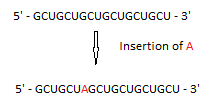Question

a.
Missense mutation
b.
Stop mutation
c.
Frame shift mutation
d.
Reverse mutation
Posted under Molecular Biology
Interact with the Community - Share Your Thoughts
Uncertain About the Answer? Seek Clarification Here.
Understand the Explanation? Include it Here.
Q. Consider a tandem repeat of the sequence GCU. Now if insertion of an A residue occurs in the message as follows, what type of mutation has taken place in this case?
Similar Questions
Explore Relevant Multiple Choice Questions (MCQs)
Q. For the process of autophagy the formation of vesicles occurs. The membrane of these vesicles are derived from ___________
View solution
Q. Lysosomes does not have which one of the following properties?
View solution
Q. Ubiquitinization always leads to the degradation of the protein.
View solution
Q. The Cdk1 activates which of the following type of Ubiquitin enzymes?
View solution
Q. Which of the following is the substrate specific enzyme of the following?
View solution
Q. The Ubiquitin-proteasome pathway is an active target for anticancer drugs.
View solution
Q. Which of the following is a Ubiquitin activating enzyme?
View solution
Q. The Ubiquitin-proteasome degradation pathway is an energy dependent process.
View solution
Q. Ubiquitin binds to the ___________ amino acid residue for degradation.
View solution
Q. Ubiquitin has ___________ of amino acids.
View solution
Q. Ubiquitin degradation mechanism recognizes ____________
View solution
Q. How many types of protein degradation pathways are seen in a eukaryotic cell?
View solution
Q. If the insertions of three nucleotides occur in a consecutive manner it causes which of the following type of mutation?
View solution
Q. Frame shift mutation can increase or decrease the length of a polypeptide.
View solution
Q. Prenylation adds prenyl groups to the ___________ amino acid residues.
View solution
Q. How many types of modification are possible in eukaryotes by addition of lipids?
View solution
Q. Initiation of glycosylation occurs in the Golgi body.
View solution
Q. In O-linked glycoproteins, the carbohydrates may be attached to how many amino acids?
View solution
Q. In the N-linked glycoprotein, the carbohydrates are attached to which of the following bases?
View solution
Q. Glycosylation is the addition of ___________ to the protein.
View solution
Recommended Subjects
Are you eager to expand your knowledge beyond Molecular Biology? We've handpicked a range of related categories that you might find intriguing.
Click on the categories below to discover a wealth of MCQs and enrich your understanding of various subjects. Happy exploring!








